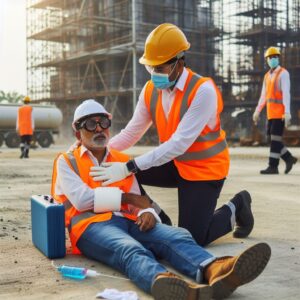
A safety engineer in the construction industry focuses on ensuring the health, safety, and well-being of workers and the public on construction sites.
- Developing Safety Plans: Safety engineers develop comprehensive safety plans and procedures for construction projects. They assess potential hazards and risks associated with construction activities, equipment, and materials, and develop strategies to mitigate these risks to prevent accidents and injuries.
- Safety Training and Education: Safety engineers provide safety training and education to construction workers, supervisors, and managers. They conduct safety orientations for new employees, instruct workers on proper safety practices and procedures, and organize training sessions on topics such as fall protection, hazard recognition, and emergency response.
- Safety Inspections and Audits: Safety engineers conduct regular inspections and audits of construction sites to identify potential safety hazards and ensure compliance with safety regulations and industry standards. They inspect equipment, tools, and work areas for safety violations, and recommend corrective actions to address any deficiencies.
- Accident Investigation and Analysis: In the event of accidents or near misses, safety engineers conduct thorough investigations to determine the root causes and contributing factors. They analyze accident data, interview witnesses, and review incident reports to identify trends and develop strategies to prevent similar incidents from occurring in the future.
- Safety Equipment and Personal Protective Gear: Safety engineers ensure that appropriate safety equipment and personal protective gear are provided to construction workers. They assess the need for equipment such as hard hats, safety goggles, gloves, harnesses, and respirators, and ensure that workers are trained in their proper use and maintenance.
- Regulatory Compliance: Safety engineers stay informed about relevant safety regulations, codes, and standards governing the construction industry. They ensure that construction projects comply with local, state, and federal safety requirements, and assist in obtaining permits and certifications related to safety and health.
- Emergency Preparedness: Safety engineers develop emergency response plans and procedures to address potential emergencies such as fires, natural disasters, and medical emergencies on construction sites. They coordinate with emergency services, establish evacuation routes and assembly points, and conduct drills to ensure that workers are prepared to respond effectively to emergencies.
Overall, safety engineers play a crucial role in promoting a culture of safety and preventing accidents and injuries on construction sites. Their expertise in identifying hazards, implementing safety measures, and training personnel is essential for creating safe and healthy work environments in the construction industry.
